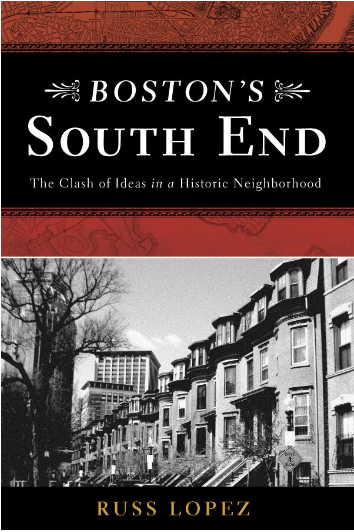#BUCPUA Professor reveals how to land the best job ever

On September 29, more than 250 policymakers and job seekers gathered at the 8th Annual Massachusetts Green Careers Conference, held at the DCU Center in Worcester. BU City Planning and Urban Affairs (BUCPUA) Adjunct Faculty Professor Eugene Benson, JD addressed the entire crowd and also led a smaller breakout session. Benson compelled the audience to pursue the best job ever – municipal conservation agent.
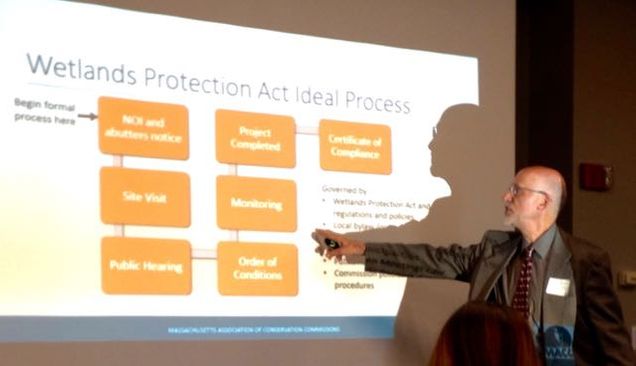
Passionate degree candidates in the #BUCPUA Program assess the social contexts and economic structures that influence the management of fragile open spaces, such as wetlands. The #BUCPUA Program provides students with high-demand tools and pertinent skills to excel as environmental planners. Relevant course offerings include UA 521 Environmental Law, UA 617 Applied Sustainability, UA 654 Geographic Information Systems for Planners, and UA 629 Urbanization and the Environment. Students can complement their Master of City Planning or Master of Urban Affairs degree with a Certificate of Applied Sustainability.
Aside from teaching law to #BUCPUA students, Benson is the Executive Director of the Massachusetts Association of Conversation Commissions (MACC). MACC’s tenants include advocacy, education, and conservation, and the state leader in providing education and training to more than 2,500 conservation commissioners. Benson urged participants to fully grasp the wetlands crisis in the United States, as half the country’s wetlands have disappeared since settlement by Europeans. This loss of wetlands has exacerbated flood conditions, particularly in states like Iowa, which has lost 80 percent of its wetlands. Wetlands perform invaluable functions by buffering floodwaters, capturing carbon, and providing habitats that sustain biodiversity.
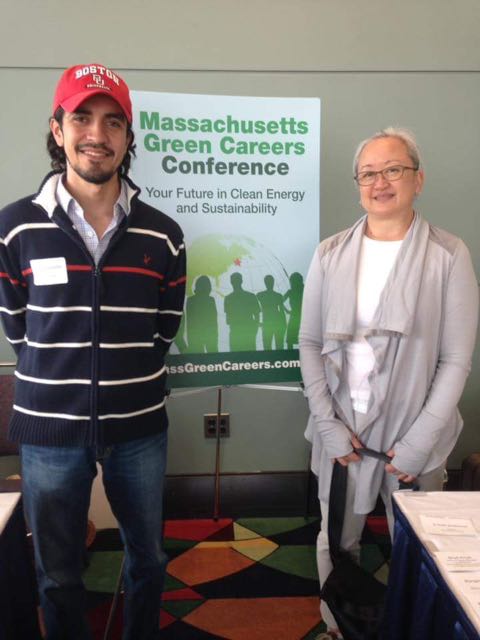
As municipal conservation agents, citizens have a direct stake over the protection and management of these vital, yet vulnerable, areas that envelop land, water, and biological resources. Conservation agents are full-time positions that support and guide all-volunteer municipal conservation commissions. On average, volunteer conservation commissions experience a 10 percent annual turnover, which underscores the value of a municipal conservation agent who can create a stable foundation for long-term planning and land management.
At the state level, the Massachusetts Department of Environmental Protection, the Massachusetts Department of Conservation and Recreation, and Massachusetts Regional Planning Agencies also offer full-time positions that directly influence the protection of open spaces. Qualifications required for state or municipal conservation agent positions include a thorough understanding of environmental law and superb communication skills that conform when influencing different stakeholder groups. Organization skills, creativity, and flexibility also help conservation agents preserve open spaces against myriad external factors, including impacts of climate change and ongoing economic development.
Aside from teaching law in the #BUCPUA Program, Professor Benson also instructs courses at the BU School of Public Health.
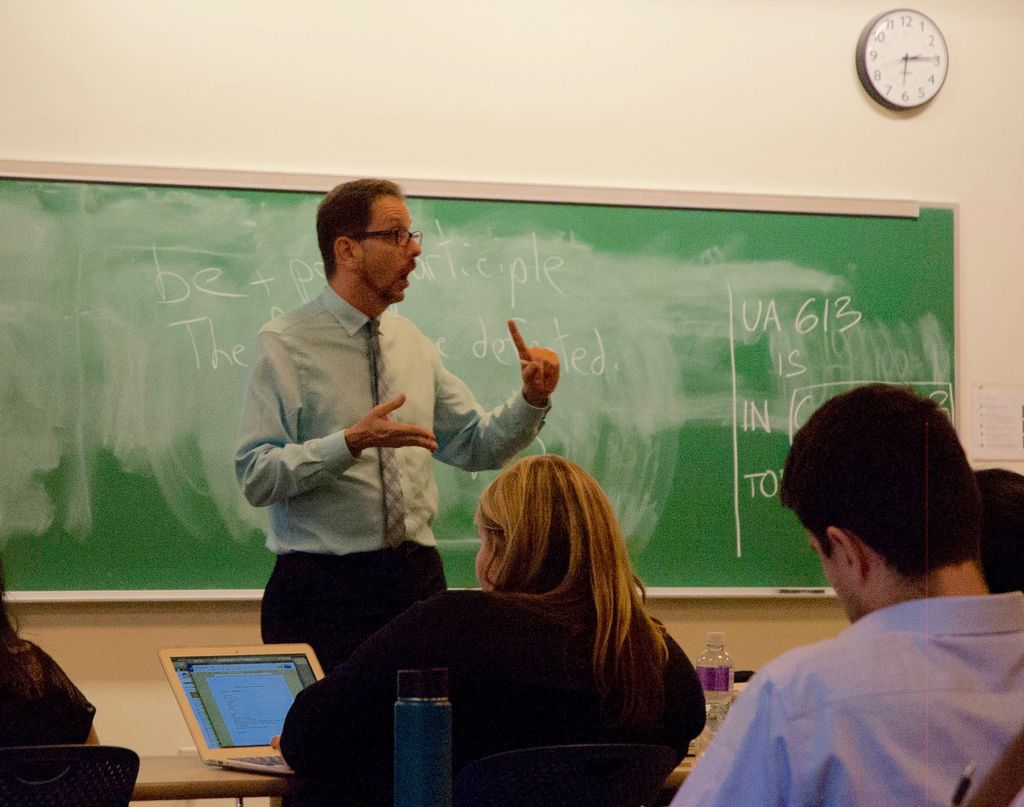
4 principles of powerful policy writing – #BUCPUA students get the scoop

On September 21, students from across BU packed into the Academic Writing for Professionals workshop. Led by Adjunct Professor William Koehler, this is the first installment of the #BUCPUA 2016 Fall Student Learning Enrichment Series. For more than 90 minutes, students absorbed free, critical instruction to enhance their professional and academic writing skills.
“You will be judged based on how you write. It’s true, folks, especially in the professional sector” warned Adjunct Professor William Koehler.
Throughout the workshop, Koehler provided useful keys to writing success, while also dispelling writing myths and cautioning against certain trends. He asserted that consistent principles must be applied when writing, whether in an email or a research paper. These principles consist of the four C’s: concise, clear, cogent and correct.
“I haven’t done any academic writing since my undergrad days!” said Jessica Martinez (MET ’19). “So this was a good refresher.” She also enjoyed learning more about the editing process, sharing that, “editing after those all-night writing binges is important!”
The audience was largely comprised of degree candidates in the Boston University Master of City Planning or Master of Urban Affairs program. The BUCPUA program provides students the cutting-edge skills and theoretical background to function as creative problem solvers in the fields of city planning, public management, and urban research, among others. This Fall, the Program witnessed its highest annual enrollment to date, totaling around 30 students.
Professionals from the public service sector listened closely as Koehler focused heavily on persuasive writing techniques. For policy recommendations to receive serious consideration for implementation, the author must adequately address the questions of “why” and “so what”. Koehler urged these policy writers to use neutral sources and peer-reviewed research, sound reasoning, and always account for opposing viewpoints.
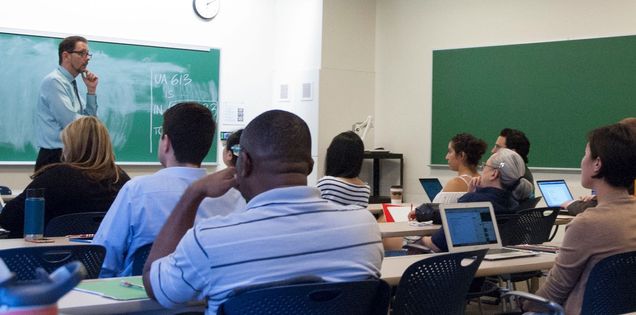
When a student raised her hand and explained her idea for a research paper, Koehler responded with tailored feedback. He listed numerous ways to sharpen her research question, considerations for whom to interview, and what questions to ask.
Another student asked about proper email etiquette, and Koehler used it an as opportunity to caution against popular trends. He explained that Millennials relate to each other using a different language style than those from Generation X or the Baby Boomer generation. Koehler chuckled, stating that emojis might not be the best writing tool to connect with someone from a different generation. When constructing an email, he suggested erring on the side of a “warm and cordial tone, but in even amounts."
This writing workshop provided an essential opportunity for students to re-think their writing style and its impact. Immediately, students can apply these fundamentals and strategies, and in turn, create a powerful impression both at work and in the classroom.
- Ines Boussebaa (CAS '16) and Courtney Thraen (MET'17)
Crowds play, learn, and win with #BUCPUA at Sustainability Festival

Student Eleanor Reagan (CAS ’18) contemplated throwing a Panera soup cup into three containers labeled compostable, recyclable or landfill. She eventually decided to throw the cup into the compostable section. Unfortunately this was the wrong choice – Panera cups have wax and go to landfill - and she lost the game. The #BUCPUA Sustainability Planning Association gave her a prize, a succulent plant, and she walked away having learned something new.
On September 15, the Sustainability Planning Association (SPA) of the BU City Planning and Urban Affairs (BUPCUA) program hosted a booth with an interactive waste game and infographics on landfills in the United States. Raymond Teoh (MET’17) explained that the goal was to educate students through games. “Similar to the GSU bins, students get confused. We want to familiarize them with sorting trash, and have them learn about sustainable planning,” he said. The BUCPUA program offers an Applied Sustainability Graduate Certificate along with several courses that address planning issues through the lens of sustainability, including courses in Actionable Sustainability and Environmental Law and Policy. Students in the #BUCPUA Sustainability Planning Association are eager to impart sustainability strategies from their courses in a real-world setting, to include the BU Sustainability Festival.
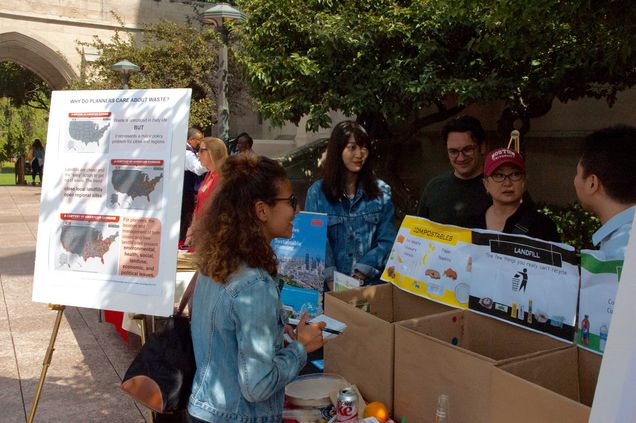
By midday, 40 to 50 students had played the game. “Students are doing really well, though there is some confusion with compostable and landfill items,” said Alejandro Delgado (MET ’17). Participants received coupons for free food from b.good, a sustainable fast-food chain that actively supports community development.
The infographics provided extra information for curious students: waste is a major policy problem for cities and regions, and landfillsare a cheap and easy solution. However, they often cause environmental, health and social problems. Teoh stated that it was important for students to know that the amount of trash has increased dramatically over the years, and what they can do to reverse the trend.
Students mentioned some difficulty with recycling and composting around campus. Monique Yaptenco (MET’18) explained that they had been listening to feedback from students and informing them of the options around campus. She added, “as planners, you have to think about how do you plan a city so people don’t have so many obstacles to recycling?” tying her experience at the booth to things learned in class.
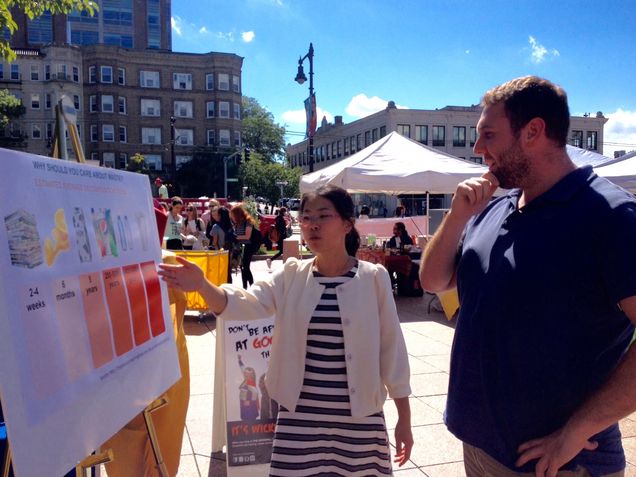
The BU Sustainability Festival hosted a variety of other green organizations, including the Institute for Sustainable Energy, Goodwill, Green Streets Initiative and the Boston Vegetarian Society, so that students could learn about all aspects of sustainability.
- Ines Boussebaa (CAS'16)
UPA walking tour illustrates history, placemaking in Boston
On a sunny, Saturday morning, 30 students from the BU City Planning and Urban Affairs program and MET International gathered for a fun, educational walking tour of Boston. Michael Schulte (MET’17), an Urban Planning Association Officer and Master of City Planning candidate, led the pack through Boston’s historical downtown.

On September 10, students discussed how eager they were to discover the historical development of Boston. Patricia Cahill (MET’18), a MCP student from Boston, was a tour guide for two years. She said, “I’ve lived here for 25 years, but I figured I’d learn something new on this tour.”
The Freedom Trail is almost three miles long, but tour guide Schulte walked through the “heart” of the route. He illustrated a wealth of historical and architectural stories, tying many of the landmarks back to notable events and figures from the Revolutionary War to Urban Renewal. For example, students discovered that Boston’s financial district nearly abutted the ocean until the land was filled in.

Camille Dugast, a MET International student from France, expressed delight at the Old State House. “All of these old buildings, like the Old State House, surrounded by modern ones, are part of Boston’s charm,” she said.
At the Exchange Building, Schulte found the structure visually unique due to its use of facadism – the façade of the building was preserved, and a skyscraper was built behind it. “There’s a tension between historical preservation and development,” said Schulte.
Another stop on the tour was Boston City Hall, an example of Brutalist architecture. Although many dislike the building’s design, it won an international, two-stage competition in 1962. “The City built it, not a museum or a university, and they weren’t afraid to be bold and innovative,” Schulte explained. He added that the building was also a visual reminder of the Urban Renewal era in Boston.

At the end of the tour, Coralie Alanda, a MET International student from France, said that her favorite part of the tour was seeing the Old South Meeting House in the middle of the city. She also added that she loved learning about facadism: “It keeps history, but adds new things. We’re not living the same way, so we need new things.”
The tour presented Boston’s history in an engaging way, and it fostered further curiosity among the students. Additionally, the event cultivated a sense of connectedness as students discovered the implications of contemporary placemaking in light of Boston’s historical character.
- Ines Boussebaa (CAS'16)
#BUCPUA Student Orientation provides sense of connection, support system for new students
Anticipation and nervous excitement filled the crowded room at BUCPUA’s Fall 2016 Student Orientation. New students began the evening as strangers but ended as strong acquaintances and friends, all eager to jumpstart their academic programs and ultimately fulfill lofty aspirations in city planning and urban affairs.
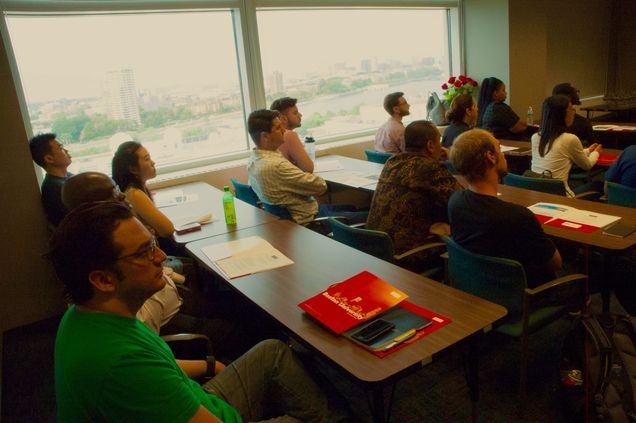
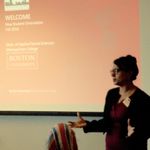
On September 7th, a record-setting 31 new students were introduced to the Program by Professor Madhu Dutta-Koehler. The orientation kicked off with the unique history of the Master of City Planning and Master of Urban Affairs degree programs. A review of the comprehensive academic and social resources at Boston University was also discussed. For Fall 2016, 67 MCP and MUA students are enrolled. Of these, 29 percent are full time and 71 percent are part time.
The students who attended were from all walks of life – student Elmo Wiratama (MET ’18) is from Indonesia and explained that he came because “this is the best country to learn city planning, and it faces similar problems to Indonesia.” He hopes to learn more about climate change and what planners can do to address its implications. Overall, 20 percent of students are international and 80 percent are from the United States.
The presentation listed degree requirements for a Master of City Planning and a Master of Urban Affairs; students can choose from 80 different elective courses for the Program, including environmental law and policy and urban transportation policy. On top of that, there are many external professional opportunities, including a directed internship program.
Matt Kramer (MET ’19), a 2016 graduate of the University of Rhode Island, was attracted to the large variety of courses offered by the Master of Urban Affairs degree. He said, “I got my acceptance letter and immediately knew this was where I wanted to be.”

At the end, students took home succulents planted in Starbucks cups, a small example of sustainable planning. These living tokens will also serve as reminders of a remarkable evening throughout the students’ time at BU.
- Ines Boussebaa (CAS'16)

#BUCPUA students go inside North America’s first commercial urban wind turbine

On August 26, #BUCPUA students and friends carpooled to Pemberton Point in Hull, Massachusetts, where they were granted special permission to crawl around inside Hull Wind 1, a wind turbine generator that reaches 164 feet high. Led by Andrew Stern, president of New England Wind Power, the group learned about the wind turbine's construction, how it creates electricity from wind, and the regulatory, financial, and engagement processes that facilitated its creation.
Hull Wind 1 was erected in 2001, making it the first commercial-grade wind turbine generator in New England and the first commercial urban wind generator in North America. This turbine produces 660kW of power and has saved Hull hundreds of thousands of dollars since 2001. In 2006, Hull Wind 2 was erected to further capitalize on Hull's strong coastal winds.

Luis Quintanilla, President of the #BUCPUA Urban Planning Association, shared the following sentiments:
This trip was a great experience to learn about the history and operation of the wind turbines in Hull, Massachusetts. It is remarkable that the residents from Hull have supported projects concerning the use of different forms of renewable energy. Wind energy is abundant and clean, meaning there are less greenhouse gas emissions and less land area required to provide energy. The town of Hull has been able to take advantage of high wind speeds from eastern Massachusetts to implement two wind turbines in 2001 and 2006, obtaining a quick return on the investments and producing clean electricity for the town. Economics are key in the success of renewable energy projects; therefore, it is crucial for planners and project managers to present the business case and its benefits very clearly to municipalities and residents in order to obtain the proper support, as Hull has done.
We also enjoyed the trip because we met students from Harvard and Northeastern universities, allowing us to exchange ideas and experiences in the field of renewable energy. We concluded our visit to Hull having a nice lunch with the group on Nantasket Beach.

- Courtney Thraen (MET'17)

Urban food course resonates with students, heightens awareness of policy impacts

During the Summer 2 term, students enrolled in UA 510 Special Topics: Feeding the City: Urban Food, met twice each week to analyze the political, social, and economic structures underlying both global and local food systems. Led by Adjunct Faculty Professor Walter Carroll, PhD, students from different academic fields, including the BU Gastronomy and City Planning and Urban Affairs programs, explored how to implement large-scale interventions to improve agricultural sustainability. Matters of food waste, food deserts or areas with minimal access to fresh food, and hunger or food insecurity were examined from several angles.
“I loved the depth and range of conversations we had about food issues. Professor Carroll did an amazing job of pushing us forward and challenging us to think in more nuanced, holistic ways while also giving us creative outlets like the Food Voice paper. Policymakers could learn a lot from this course because we studied how food connects to a broad range of other issues surrounding public health, economic development, inequality, and discrimination. I would love to see policymakers work towards goals of broader food justice and security,” shared Jacob Harrington (GRS ‘16).
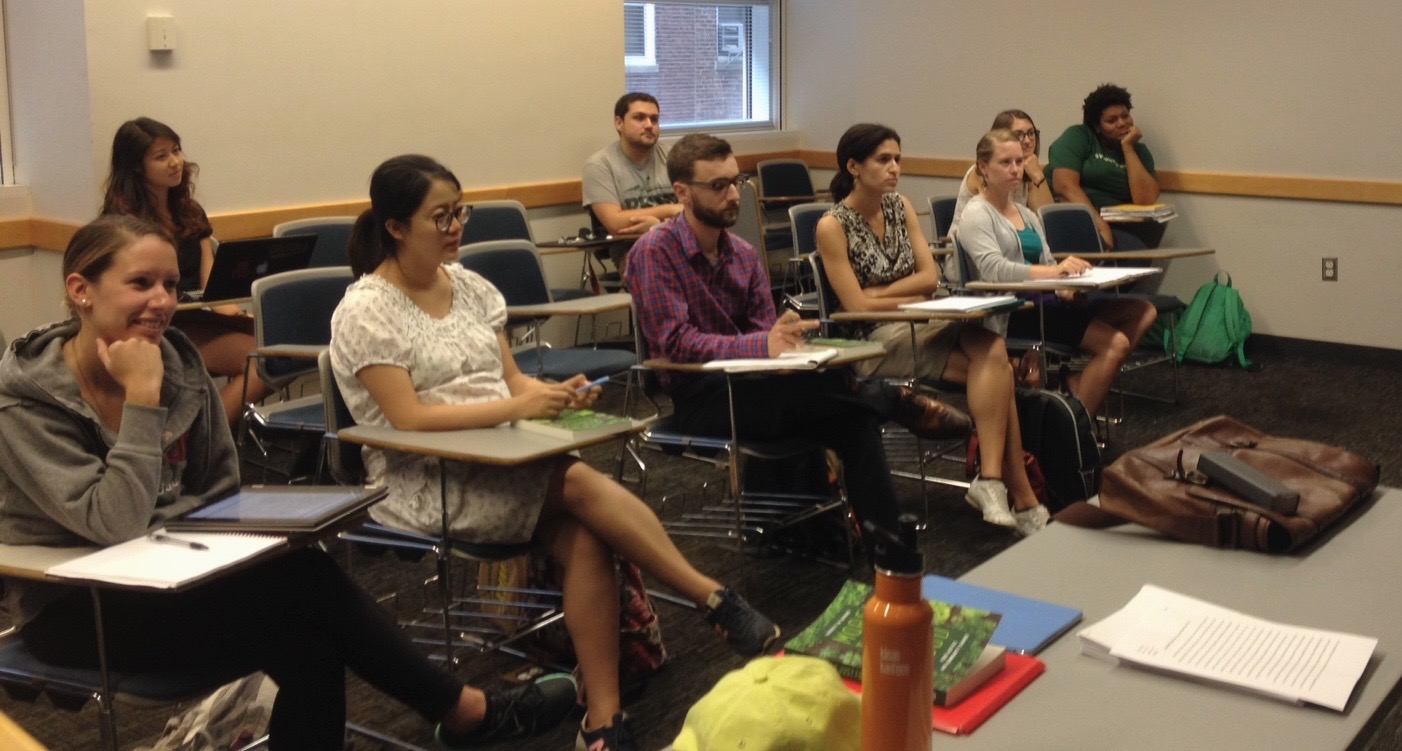
Professor Carroll charged the students to look inward and examine their lifelong relationship to food. Annie Hauck-Lawson developed the concept of the “food voice,” the theoretical concept underlying Gastropolis (Hauck-Lawson and Deutsch, 2010). Students created Food Voice papers to show how the food they chose to procure, prepare, and eat (or not eat) was a greater expression of their overall identity. These Food Voice papers helped students understand how their ethnic and socioeconomic backgrounds greatly impacted how they relate to food as adults.
"For cities to be sustainable, we must examine our food supply and consumption systems. This is an urgent issue that affects all community members and will become increasingly imperative as cities grow. This class challenged us to explore creative ideas, learn from each others' experiences and knowledge and critically examine urban food structures. I would take this class again in a heartbeat and I hope to explore food issues in the future," said Kate White (MET’17), a candidate in the Master of City Planning program.
The course culminated with each student submitting a paper on a specific food policy; each topic was deliberated among all class members to garner recommendations for further research and development. Additionally, students addressed the social, economic, and political hurdles stunting equitable, sustainable food policies in the United States and abroad, along with sharing an array of tactics for overcoming these obstacles.
- Courtney Thraen (MET'17)

At #BUCPUA, acclaimed researcher shares the latest health impacts from urban sprawl

On July 20, Dr. Russ Lopez, PhD, an adjunct assistant professor at the Boston University School of Public Health, visited BU City Planning and Urban Affairs (BUCPUA) students in Felix Zemel’s UA 510 Course, Public Health and the Built Environment. As a researcher, Lopez has spent nearly two decades exploring how the built environment has affected public health.
“How do we know the things we know? What are planners doing wrong today that they may regret in the future?” Lopez asked the future city planners.
Lopez walked students through the history of public health in the urban environment, describing the unsanitary conditions in tenements, the perceived promise of suburbia, and the recent revitalization of urbanism. Moreover, Lopez revealed the data sources used to measure public health impacts, ranging from photographs and child mortality rates to property tax records and income disparities by zip code. However, Lopez cautioned that public health research remains daunting, particularly if health and behavioral data lacks variation within census blocks.
“Research shows that urban sprawl has played a role in the risk of obesity, frequency of traffic accidents, and convenient access to medical care,” shared Lopez. These factors often lead to more chronic illnesses, including diabetes mellitus, asthma, cardiovascular disease, and cerebrovascular disease.
The recent uptick in urban populations presents systemic design issues for planners. Lopez stated that the percentage of walkable land within cities must increase, attesting that both public transit and jobs should be accessible by walking a mere fifteen to twenty minutes. In turn, the recent growth of cities should jumpstart public transportation improvements that demonstrate increasingly reliable, frequent service. Last, Lopez underscored the financial difficulty of living in an urban environment, such as Boston. He pointed out that the government’s tax systems should help make housing an affordable and convenient option for all.
Aside from teaching at BU , Lopez also instructs courses at Northeastern University. His published research also examines health effects tied to racial segregation and income inequality, the role of neighborhoods in long-term diets and exercise interventions, and the influence of schoolyard renovations on student test scores. This year, Lopez authored Boston’s South End: The Clash of Ideas in a Historic Neighborhood.
- Courtney Thraen (MET'17)

Public health leader proves residents and researchers can partner to catalyze policy change

On July 18, Dr. Doug Brugge, PhD, a professor of public health and community medicine, visited BU City Planning and Urban Affairs (BUCPUA) students in Felix Zemel’s UA 510 Course, Public Health and the Built Environment. As director of the Community Assessment of Freeway Exposure and Health (CAFEH), Brugge described the lasting impacts of ultrafine particle pollution and elaborated upon wide-ranging policy solutions.
“Yet, today, the most recent estimates still suggest that more than 100,000 Americans die each year, mostly from cardiovascular disease, from breathing in the (reduced) levels of PM2.5 that remain in our air. Indeed, PM2.5 appears to have health consequences similar to the effects of second hand smoke, an exposure that the public will no longer tolerate” (Brugge and Zamore, "Particulate Pollution: Regulated, but Still Killing").
Because ultrafine particles are odorless and invisible to the unaided eye, people are often oblivious to their presence and potential harm; the EPA has yet to even regulate them. Starting in 2008, Brugge and his CAFEH research team commenced a cross-sectional study to monitor particle levels near highways in Chinatown, Somerville, Dorchester, and South Boston. A recreation vehicle (equipped with an air monitoring system) collected data on particulate concentrations, and the results were communicated to stakeholders through telling graphics.
Upon reviewing the particulate concentration results in Somerville, Chinatown, Dorchester and South Boston, the CAFEH team developed intervention strategies through the community-based participatory research (CBPR) framework. Zemel’s students recently studied CBPR, defined as “a collaborative approach to research that equitably involves all partners in the research process and recognizes the unique strengths that each brings. CBPR begins with a research topic of importance to the community and has the aim of combining knowledge with action and achieving social change...” (W.K. Kellogg Foundation’s Community Health Scholars Program, 2001).

Throughout the CBPR process, CAFEH partnered with residents in the targeted areas to collect feedback; a design charrette was even conducted for the case studies in Somerville and Chinatown. Solution examples included improved air filtration systems, placement of air intakes away from roads, soundproofing, land buffers, and vegetative barriers. These design and policy interventions may greatly improve the public health of those living near major highways, especially for low-income residents. Protection of children and elderly should be prioritized, especially while they attend public schools or civic centers near highways.

Brugge also directs the Tufts Community Research Center. Aside from instructing in the Department of Public Health and Community Medicine at Tufts University School of Medicine, he also holds secondary appointments in Civil and Environmental Engineering, Biomedical Sciences and at the Jonathan M. Tisch College of Active Citizenship and Public Service. Brugge has contributed to more than 130 publications and strives to see research translated into active policy practice.
- Courtney Thraen (MET'17)

#BUCPUA students get immersed in the latest environmental news and policy reforms

During the Summer 1 term, BU City Planning and Urban Affairs students enrolled in UA 610, Urban Environmental Issues, met twice each week to analyze local and global environmental events and related policy implications. Led by Adjunct Faculty Professor Kwabena Kyei-Aboagye, JD, students developed solutions to improve ongoing urban environmental problems. Specifically, students studied how urban water bodies become polluted from stormwater runoff and combined stormwater-sewer systems.
“I appreciated how this class made me pay attention to current environmental news. I’ve even found myself looking up articles on my own time because I’m very interested in environmental issues. I’m currently on track to graduate with the applied sustainability certificate that is offered within the BUCPUA program,” shared Erin Bastyr (MET ’17), master of city planning candidate.
Not only did the course evaluate how Boston’s impervious spaces caused polluted stormwater runoff to harm the nearby Charles and Neponset Rivers, but the students also discussed the financial and technological methods to reverse this damaging urban trend. 

For instance, a wide array of policy tools were reviewed through the lens of accountability and enforcement, including the Massachusetts Watershed Initiative, Federal Water Pollution Control Act, and the Clean Water Act.
Professor Kyei-Aboagye manages the Massachusetts Urban Environmental Program and discussed the Charles River Initiative, which aims to make the Charles River both swimmable and fishable. This program reduced sewage-contaminated stormwater flows from illicit storm drain connections. These illicit storm drain connections had been polluting the Charles River for years, exacerbating damage to its ecosystem.
Most importantly, though, civic engagement was underscored as the best tool to protect the environment. First, many citizens are uneducated about the impacts of their daily behavior upon the environment. The class agreed that environmental awareness education should start with children in the public school system. Recently, Senator Markey (D-Mass.) introduced the Climate Change Education Act (S.3074) to facilitate both environmental learning and public outreach programs.
Additionally, environmental planners must dedicate long hours, hard work, and the right communications approach to effectively protect disenfranchised citizens from pollution. Heightening awareness of environmental justice issues can ensure generations of families are not unfairly affected by pollution, especially for those living near highway overpasses or industrial plants. 
Upon the course’s conclusion, planning students understood the myriad implications of pollution and competing perspectives about climate change. However, they were also equipped with comprehensive policy strategies to help mitigate and reverse the complex causes of pollution both here in Boston and around the world.
- Courtney Thraen (MET'17)

Former Massachusetts Secretary of Transportation visits #BUCPUA, shares proposals for sustainable mobility in the 21st Century
On June 28, Jim Aloisi, a Boston-based writer, commentator and consultant, visited BU City Planning and Urban Affairs (BUCPUA) students in in Doug Johnson’s UA 510 Course, Transit-Oriented Development in the 21st Century.

Aloisi used his experiences as the former Massachusetts Secretary of Transportation to form 21st Century policy recommendations. However, Aloisi also described the ideological, legal, and bureaucratic barriers that often inhibit these changes.
Aloisi recently spoke at the Smart City Event held at Amsterdam Arena. He commended how efficiently the Netherlands implemented sustainable, transit-oriented development, demonstrated by its high rates of cycling and walking.
Here in Boston, Aloisi described how transit systems are operated by 20th century infrastructure, policies and regulations. As Boston’s population approaches 700,000 residents, its transit capabilities cannot accommodate continued, growing demand. To start, Aloisi asserts that institutional and civic fragmentation within the City must be supplanted by integrating transit, safety, and equity silos.

“Transportation must respond to our collective values. This great transition can be accomplished through new sources of energy, revenue, and technology to establish new mobility paradigms. Accordingly, complementary policies, systems, and infrastructure must respond to the current and future needs of urban citizens, especially in Boston,” Aloisi stated.
“As planners and policy makers, we must reinforce equity through funding of regional and multi-modal transit. However, political and economic cycles can facilitate displacement of low-income people from transit-rich areas. Municipalities like Revere and Everett have seen an influx of these displaced residents. It’s of primary importance that public transit supports and serves those who need it most, such as low-income people. Planners and policymakers need to ensure their voice is heard,” asserted Aloisi.
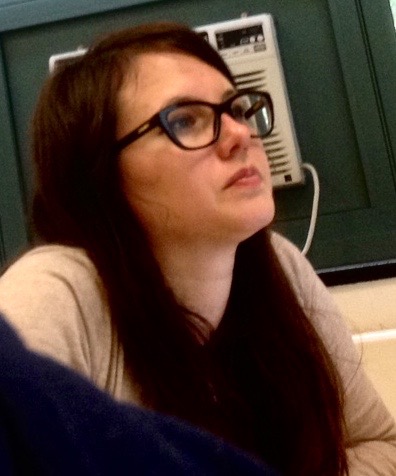
Aloisi is currently a founding partner of the Pemberton Square Group, LLC and is acting editor of the City Protocol Society. From 2008 to 2009, Aloisi served as the Massachusetts Secretary of Transportation. Furthermore, he also served on the boards of the Massachusetts Port Authority and Massachusetts Turnpike Authority. Aloisi is a former partner at Hill & Barlow and Goulston & Storrs. Aloisi contributes articles to the MassINC’s Commonwealth Magazine and has written three books.
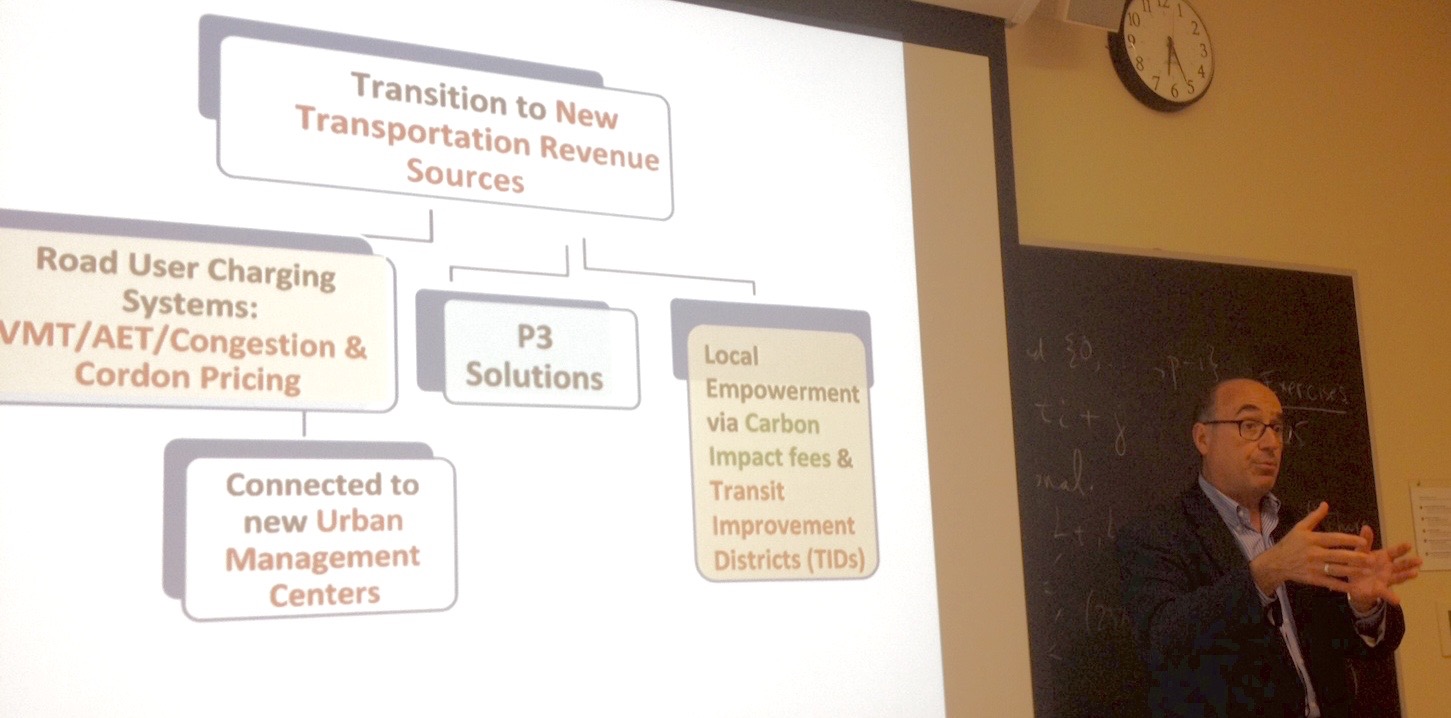
- Courtney Thraen (MET'17)
